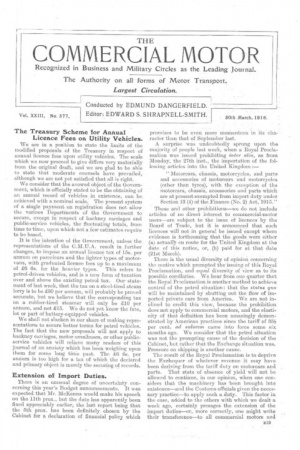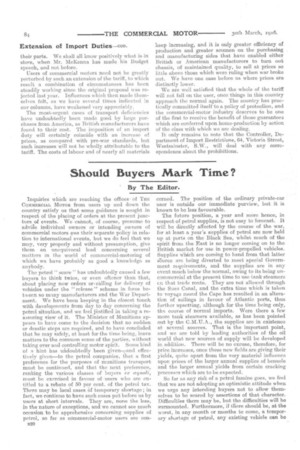The Treasury Scheme for Annual Licence Fees on Utility Vehicles.
Page 1

Page 2

If you've noticed an error in this article please click here to report it so we can fix it.
We are in a position to state the limits of the modified proposals of the Treasury in respect of annual licence fees upon utility vehicles. The scale which we now proceed to give differs very materially from the original draft, and we are glad to be able to state that moderate counsels have prevailed, although we are not yet satisfied that all is right.
We consider that the avowed object of the Government, which is officially stated to be the obtaining of an annual record of vehicles , in existence, can be. achieved with a nominal scale. The present System of a single. payment On registration does not allow the various Departments of the Government to secure, except inrespect of hackney carriages and public-service vehicles, the fluctuating totals, from time to time, upon which not a few estimates require to be based.
It is the intention of the Government, unless the representations of the C.M.U.A. result in further.
changes, to impose an annual licence tax of 15s. per annum on parcelcars and the lighter types of motorvans, with graduated licence fees up to a maximum of £6 6s. for the heavier types. This refers to petrol-driven vehicles, and is a new form of taxation over and above the existing petrol tax. Our statement of last week, that the tax on a steel-tired steam lorry is to he 130 per annum, will probably be proved accurate, but we believe that the corresponding tax on a rubber-tired steamer will. only be 110 per annum, and not £15. We do not yet know the fate, lot or part of battery-equipped vehicles.
We shall not slacken in our share of making representations to secure better terms for petrol vehicles. The fact that the new proposals will not apply to hackney carriages, motor omnibuses, or other publicservice vehicles will relieve many readers of this journal of an anxiety which has been weighing upon them for some long time past. The £6 Os. per annum is too high for a tax of which the declared and primary object is merely the securing of records.
Extension of Import Duties.
There is an unusual degree of uncertainty concerning this year's Budget announcements. It was expected that Mr. McKenna would-make his speech on the 11th prox., but the date has apparently been fixed appreciably earlier, the last report being that the 5th prox. has been definitely chosen by the Cabinet for a declaration of financial policy which promises to be even, more momentous in its character than that of September last.
A surprise was undoubtedly sprung upon the majority of people last week, when a Royal Proclamation was issued prohibiting inter alia, as from Monday, the 27th inst., the importation of the following articles into the United Kingdom:— " Motorcars, chassis, motorcycles, and parts and accessories of Motorcars and motorcycles (other than tyres), with the exception of the mOtorears, chassis., accessories and parts which are at present exempted from import duty under Section 13 (4) of the Finance (No. 2) Act, '1915."
These and other prohibitions—we do not include articles of no direct interest to .commercial-motor users—are subject to the issue of licences by the Board of Trade, but it is announced that such licences will not in general be issued except where evidence is forthcoming that the goods were either (a) actually en route for the United Kingdom at the date of this notice, or, (b) paid •for at that date (21st March).
There is the usual diversity of opinion concerning the. motive which prompted the issuing of this Royal. Proclamation, and equal diversity of view as to its possible corollaries. We hear from one quarter that the Royal Proclamation is another method to achieve control of the petrol situation: that the status quo will be maintained by shutting out the flow of imported private cars from America. We are not inclined to credit this view, because the prohibition does not apply to commercial motors, and the elasticity of that definition has been amazingly demonstrated by American practices since the tariff of 33i• per cent, ad valorem came into force some six months ago. We considerthat the petrol situation was not the prompting cause of the decision of the Cabinet, but rather that the Exchange situation was. Pressure on shipping is another cause.
The result of the Royal Proclamation is.to deprive the Exchequer of whatever revenue it may have been deriving from the tariff duty on motorcars and parts. That state of absence of yield will not be allowed to continue, in our opinion, when one considers that the machinery has 'been brought into existence—and the Customs officials given the necessary practice—to apply such a duty. This factor in the case, added to the others with which we dealt a week ago, certainly presages the extension of the import duties—or, more correctly, one might write their transference—to all commercial motors and their parts. We shall all know positively what is in store, when Mr. McKenna has made his Budget speech, and not before.
Users of commercial motors need not be greatly perturbed by such an extension of the tariff, to which result a combination of circumstances has been steadily working since the original proposal was rejected last year. Influences which then made themselves felt, as we have several times indicated in our columns, have weakened very appreciably.
The most-urgent eases of transport deficiencies have undoubtedly been made good by large purchases from America, as British manufacturers have found to their cost. The imposition of an import duty will certainly coincide with an increase of prices, as compared with pre-war standards, but such increases will not he wholly attributable to the tariff. The costs of labour and of nearly all materials keep increasing, and it is only greater efficiency of production and greater acumen on the purchasing and manufacturing sides that have enabled either British or American manufacturers to turn out chassis, of maintained quality, to sell at prices so little above those which were ruling when war broke out. We have one case before us where prices are distinctly lower.
We are well satisfied that the whole of the tariff will not fall on the user, once things in this country approach the normal again. The country has practically committed itself to a policy of protection, and the commercial-motor industry deserves to be one of the first to receive the benefit of those guarantees which are conferred upon home-production by action of the class with which we are dealing.
It only remains to note that the Controller, Department of Import Restrictions, 64, Victoria Street, Westminster, S.W., will deal with any correspondence about the prohibitions.






















